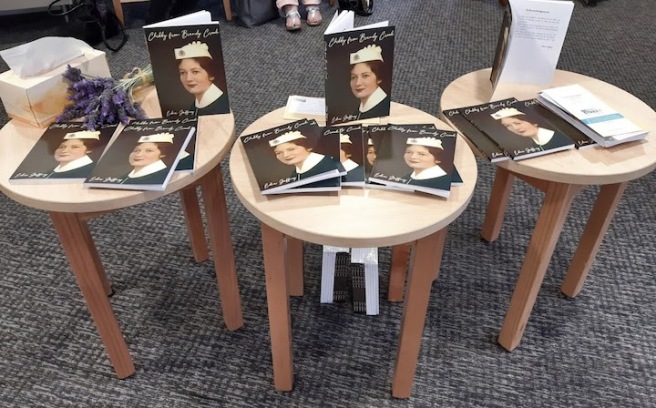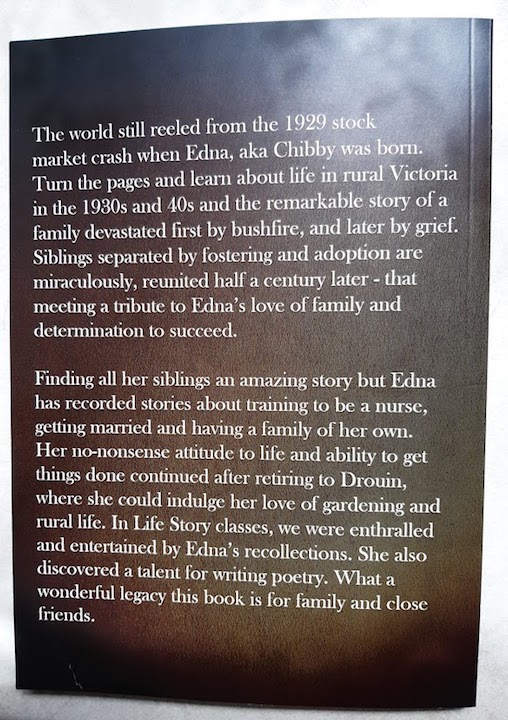
There is no greater thrill for a teacher of creative writing than to see the joy on a student’s face when they hold in their hands, the book they have written.
When that student has put years of effort into making the dream a reality and overcome health problems, the moment even sweeter.
Yesterday, I met up with some past students of my Life Stories & Legacies class that ran from February 2014 – December 2018, at Godfrey Street Community House in Bentleigh. We gathered in Sandringham to celebrate with Edna Gaffney the publication of her memoir, Chibby From Brandy Creek.
The Life Stories class at Godfrey Street, one of the most cohesive, supportive and friendliest classes in my 20 plus years of teaching, which has included four community houses. Several of the students still meet monthly and email or phone each other regularly.
Edna is the second to publish a memoir, another student will have one out for Christmas and another perhaps in the New Year. A great bunch of writers dedicated to their purpose of leaving a legacy for family and friends. They have all led amazing lives spanning decades.

Edna was in her mid-eighties when she came to my class with a determination to write a book about her mother, family life in Gippsland between the wars, and also her own life as a nurse, particularly, as one of the first nurses to be trained at Cabrini Hospital to care for cancer patients undergoing chemotherapy.
In her Dedication, Edna wrote:
These efforts to record memories, I dedicate to my family and future generations. I wanted to describe my early life living in Gippsland, rural Victoria, and to honour my mother. Our family experienced a lifestyle and events different to many others and to the expectations of people today.
Miracles can occur in most families, maybe not suddenly, but over time, and I consider the eventual reunion of my siblings after the death of our mother, a miracle. Six siblings were adopted during 1943-44 and the family split up, yet we eventually reunited as adults and became a family once again. I am writing down some details of our early life for those siblings who have no memories of our natural mother.
I also record my own experiences of family and career. Change of attitude, much-needed patience and endurance to cope and care for others, are some of the qualities I learned in my working and family life – becoming a parent a profound change. My chosen profession of Nursing has altered dramatically since I began Mothercraft Nursing at the Berry Street Babies’ Home in 1947.
A Powerful Story Shared
When Edna enrolled in 2014, like many older students, she had no computer skills and in fact, no computer. However, after absorbing what it means to be a writer in the modern world, Edna enrolled in computer classes at the Community House and bought a laptop.
I don’t think she’d mind me saying that her success in writing this book was not replicated in the computer class! Wisely, she concentrated on the writing and saved money and time by allowing her daughters and me help with typing. I have no idea what happened to the laptop except it was often threatened and may indeed have been ‘chucked out the window’.
Edna’s daughter, Jane-Maree arranged the launch yesterday and was a driving force in the final stages of the project as her mother’s health deteriorated. We were determined the book would be published before Edna’s 90th birthday on July 2, 2019, and made the deadline.
However, the actual launch delayed while Edna settled into a nursing home – a disruptive, often devastating, and certainly time-consuming challenge for everyone concerned.
Fortunately, Edna likes her new home and Jane-Maree said, ‘they were great’ providing the comfortable space for the celebration.
The Journey To Publication

Over the years, I published five of the nine anthologies for the Mordialloc Writer’s Group. Along the way I threw myself into lifelong learning, grappling with InDesign, attending workshops on desktop and digital publishing, reading books, online articles, trawling websites and information from email lists, and watching webinars to keep up with the rapid changes in the writing and publishing industry.
It is a privilege to share those skills with writing students and to be trusted with their precious words when they decide to publish. I know there are some disastrous self-publishing efforts and looking back at my early efforts, improvements can certainly be made, but I have become a small press publisher by accident and will continue to learn on the job.
Software and hardware capabilities and printing options have radically changed in a few short years. The cost, which has a big impact on choice has changed too – you get a bigger, better bang for your buck nowadays!

The aim of most writers is to be published – not necessarily a novel, memoir, or poetry book, but perhaps simply a short story or poem that begged to be written, or a slice of family history or an anecdote so memorable, it must be committed to print. (I prefer printed books.)
Some students come to class with a definite project in mind. They have a dream to publish a book with a target audience of friends and family.
Not everyone aims to have a book in Readings or become rich and famous with a bestseller or win a prize.
Not everyone wants to monetize (how I hate this buzz word) their talent or creativity.
Most want to write and publish for the joy and satisfaction of telling a story/stories and being able to share their writing with others who will read and appreciate their words. They desire to write or would feel strange not writing, perhaps love being a wordsmith.
When you believe in yourself and writing, being published is a realistic achievable dream.
Edna had a powerful story to tell and I gladly helped with advice and editing. My talented daughter, Mary Jane designed the cover, as she has done for several book ventures. (A reluctant book cover designer, she doesn’t refuse to help her mum.)
The class gave Edna feedback and encouragement and through this collective effort, a beautiful and readable book was offered free of charge yesterday with an option to donate to Berry Street Babies Home. (most people did!)
When you read Edna’s book you understand her strong commitment to Berry Street, where she trained as a Mothercraft Nurse, but also the deeply emotional link because of family circumstances.

Books for Purpose Not Profit
This is the third book I’ve produced whereby the writer has donated all or most of the profit because of their commitment to a cause or appreciation of events or people. There was no profit involved with Mordialloc Writers’ anthologies either, with any money from sales going towards the publication of the next book.
When Mordialloc Writers’ Group folded in 2018, I donated group funds to Mordialloc Beach Primary School to create a scholarship and encourage creative writing. The Principal, Sue Leighton-Janse suggested the money provide ongoing writing awards for Junior, Middle and Senior school, in the name of MWG. I only hope this happens.
You can read about Julie Wentworth: A Life Shared here. Julie, a teacher of Yoga, mentor and spiritual guide, donated the sale of her books to an orphanage in Africa caring for children with HIV.
Mary Jane and I had the privilege of working with Peter Hocking, who wrote about his recovery from a stroke and sold books to support The Stroke Foundation.
I’m sure writing and publishing is often a labour of love, and if articles discussing the state of publishing in Australia are to be believed, poetry books, even traditionally published, seldom make a profit with publishing houses using the sales from more popular books to counter-balance the low-profit margin in some literary genres.
Another book I worked on this year was a huge labour of love for a woman who wanted to celebrate her 70th birthday by publishing travel diaries kept by her parents on their first overseas trip in the 1970s.
Ruth inherited the handwritten exercise books, 500 slides and meticulously detailed itinerary notes and letters home. What to do with this material so that her brothers and sisters, her children, nieces and nephews, grandchildren will enjoy the old school and very personal travelogue?
She had a friend type the 55,000 words, paid to digitise then print the slides, and commissioned a nephew to draw maps of the route her parents travelled through continents and several countries, to introduce the three separate parts of their trip.


Ruth only printed 25 of this A4 landscape book, which I edited and published. Muriel and Len’s observations were side by side and Mary Jane chose 100 of the best photographs. Mary Jane created Ruth’s vision for the cover using Muriel and Len’s passport photos, the best close-up photographs Ruth possessed.
Not every book needs a launch or a large audience. Often writers can cover their costs and break-even. Family members may contribute or if written for a target audience (sporting/hobby club, regional or historical relevance) writers may make a small profit by self-publishing.
Writers keep control and have important input to the content, cover and cost of their book every step of the way from conception to birth if they self-publish.
It’s an exciting and worthwhile journey – not always smooth – but as John Denver sings in one of my favourite songs, ‘some days are diamonds, some days are stone,‘ and yesterday for Edna, her family and friends was a diamond day.
Well done Edna and thank you for allowing me to be a part of your dream!













































































